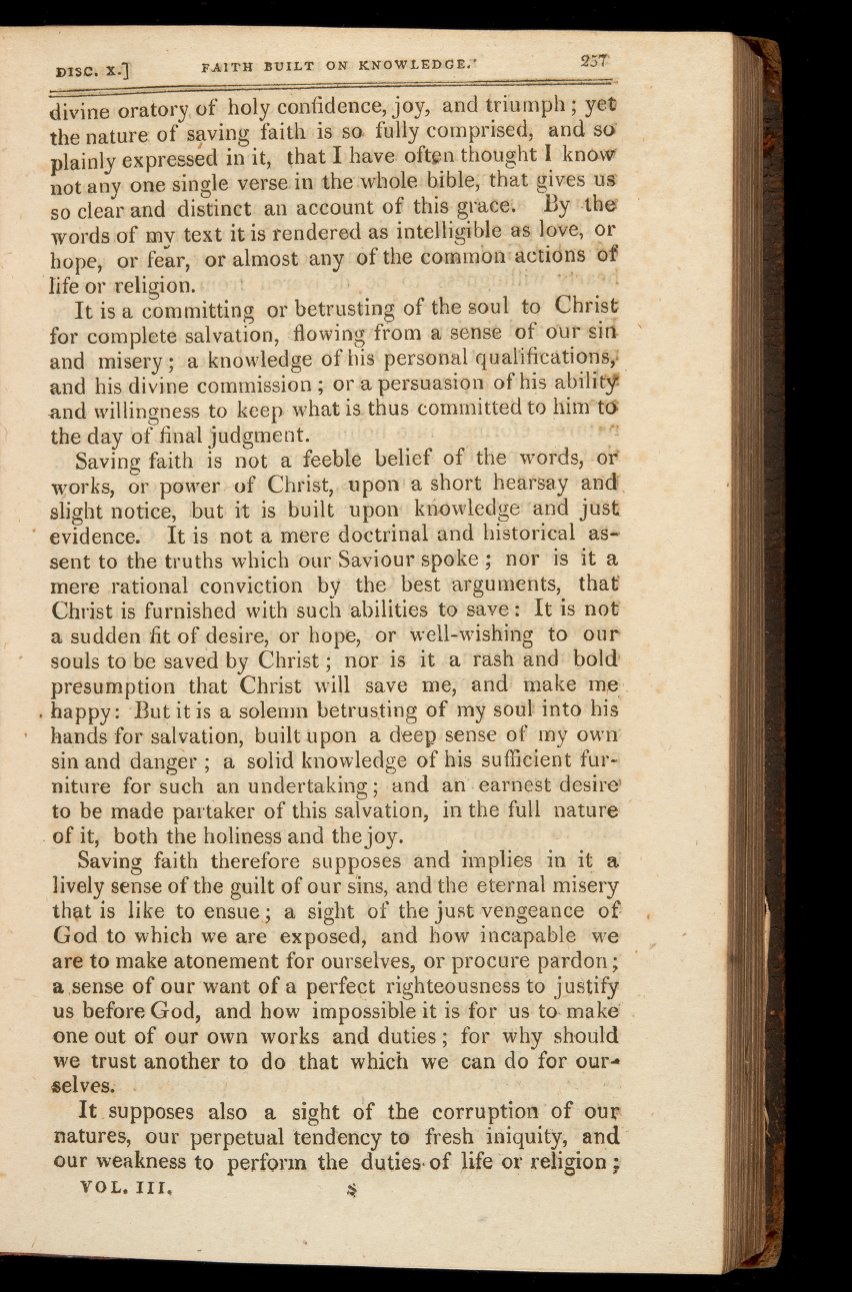

DISC.
X.1
FAITH
BUILT
ON
KNOWLEDGE.'
237
divine oratory
of
holy confidence,
joy, and triumph
;
yet
the
nature of
saving
faith
is so
fully
comprised,
and
so
plainly expressed
in it,
that I
have often
thought
I
know
not
any
one
single
verse
in
the
whole bible,
that
gives
us
so
clear and
distinct
an account
of
this grace.
By
the
words
of
my
text it
is
rendered
as
intelligible
as
love,
or
hope,
or
fear,
or almost any
of
the
common actions
of
Iife
or
religion.
It
is
a
committing or
betrusting of
the soul to
Christ
for complete salvation,
flowing
from
a
sense
of our
sin
and
misery;
a knowledge
of
his
personal qualifications,
and
his
divine commission
;
or
a
persuasion
of
his
ability
and
willingness to
keep what
is
thus committed
to
him
tö
the day
of
final
judgment.
Saving
faith
is
not
a
feeble
belief of
the
words,
or
works, or
power
of
Christ,
upon a short hearsay
and
slight notice,
but
it
is
built upon
knowledge and
just
evidence.
It
is
not a mere doctrinal and historical
as-
sent
to the
truths
which
our Saviour spoke
;
nor
is
it
a
mere rational conviction
by
the best arguments,
that
Christ
is
furnished
with
such abilities to
save
:
It
is
not
a
sudden
fit
of
desire, or hope,
or
well
-
wishing
to
our
souls to
be
saved
by
Christ
;
nor
is
it
a rash
and
bold
presumption that Christ
will save me,
and make
me.
happy:
But it
is
a solemn
betrusting
of
my
soul
into
his
hands for salvation,
built upon a deep
sense
of
my
own
sin
and
danger
;
a solid knowledge
of
his sufficient
fur-
niture
for such an
undertaking
;
and an earnest
desire'
to
be
made
partaker of
this salvation, in the
full
nature
of
it,
both
the holiness
and the joy.
Saving
faith
therefore supposes and
implies
in
it a
lively
sense
of
the guilt
of
our
sins,
and
the
eternal
misery
that
is
like to
ensue;
a
sight
of
the
just
vengeance
of
God
to
which
we
are exposed, and
how
incapable
we
are
to make
atonement
for ourselves,
or
procure
pardon;
a
sense
of our
want
of
a
perfect righteousness
to
justify
us
before God, and
how
impossible
it
is
for
us
to
make*
one out
of
our
own
works
and
duties
;
for
why
should
we
trust another
to do
that
which
we
can
do
for
our-
selves.
It
supposes also
a
sight
of
the
corruption
of
our
natures, our
perpetual
tendency to
fresh iniquity,
and
our
weakness
to perform
the
duties of
life
or religion ;
VOL.
III.

















